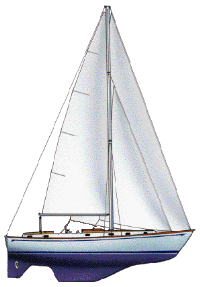![]()
From Cruising World, November 1997
 |
Peterson 44 Specifications:
|
 |
The Peterson 44 features a low-profile center cockpit that remains pleasing to the eye and keeps weight low physically as well as visually. The long-fin keel with cutaway forefoot and afterbody reduces wetted surface for good light-air performance and provides a shorter turning radius. A full-size molded-in skeg supports the rudder and provides good protection during the occasional grounding. Protected also is the prop, mounted in an aperture between the skeg and the rudder. Displacement of 30,000 pounds (10,000 of this is buried in encapsulated lead ballast) gives the Peterson 44 an easy motion at sea.
On deck, a double-spreader cutter rig supports 1,011 square feet of working sail. The center cockpit is intelligently laid out and accommodates a full-size dodger and Bimini. From the cockpit, two companionways, both protected by bridge decks, provide outside access to the fore and aft cabins. Each Peterson 44 was delivered with factory-installed bow rollers and a manual windlass. Most boats� windlasses have been replaced with electric versions, but the bow rollers and chain lockers are still adequate, although some owners have beefed up their rollers to handle side loads better. The deck and coachroof are cored with plywood and generally have stood up well.
Entering the main cabin through the forward companionway reveals one of the better belowdeck layouts you�ll find in a center-cockpit cruiser. A full-size U-shaped galley is located to port near amidships. It easily accommodates a good-size freezer and refrigerator without compromising storage or counter space, and with room for a sizeable double sink.
To starboard is a large, first-class nav station, close enough to the cockpit for easy communication. To starboard and back through the passageway is the aft cabin, with a double berth and separate head with shower. Forward is a traditional main cabin layout with dinette to port and settee to starboard, a second head with shower and a reasonably large V-berth. The tri-cabin accommodates seven. Three hatches and six opening ports ventilate the main cabin; four ports and two hatches ventilate the aft cabin.
Under the cockpit and accessible from the passageway is the engine and equipment space, which contained originally a 62-hp Perkins 4-152 diesel though some boats were delivered with Ford Lehman 80-hp diesels. The larger engine is a good match for a boat of this displacement. A nine-foot prop shaft incorporates two cutless bearings, one at each end of the long stern tube, to provide extra support. The forward cutless is hidden behind the shaft log and may escape periodic inspection.
Storage is excellent, with abundant locker space for the long-haul voyager. Four separate stainless steel tanks carry 132 gallons of water, and fuel capacity is 117 gallons in two painted steel tanks. The tanks have been a minor source of difficulty: Over the years, they have developed cracks and leaks that could only be stopped by tank replacement. Problems with fuel tanks are less common.
Underway, the Peterson is easy on the helm. A servo-pendulum windvane will handle steering chores even with the long run of control lines to the center-cockpit-mounted wheel; most autopilots will steer happily as well. Owners report that heaving to with a reefed main and staysail set is the preferred heavy weather strategy.
Most owners will tell you it is the boat�s sailing performance that impresses them most. With ready-to-go, well-equipped versions of this boat selling for $110,000 to $125,000, brokers often have waiting lists.